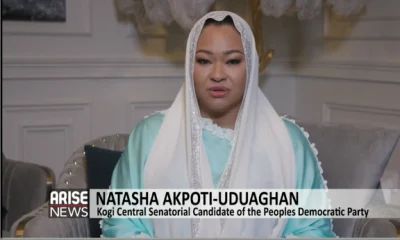Opinion
In Defense Of Due Process: A Right Of Reply To The Natasha-Akpabio Narrative
By Engr Ike Chidolue

Ogunsakin Mustapha’s recent article, “Twists and Turns as Natasha and Akpabio Clash”, is a disappointing exercise in emotional posturing and selective narration, not journalism. Rather than interrogate the core substance of Senator Natasha Akpoti-Uduaghan’s serious, damaging, and evidence-free allegations, the writer retreats into the safe embrace of sympathy politics—offering readers sentiment in place of scrutiny.
It is baffling that such a grave allegation—one that seeks to impugn the character of the Senate President and distort the integrity of Nigeria’s upper legislative chamber—is treated with the lightness of a human-interest piece. This is not a matter for warm storytelling. This is a matter of law, evidence, procedure, and consequences.
Let it be clear: we are not in the business of building castles in the air. We are here to build a house—brick by brick—with facts, logic, and the weight of truth. And in that house, there is no room for the evasions and rhetorical flourishes that Mr. Mustapha and his fellow travelers have offered in place of accountability.
The sexual harassment allegation made by Senator Akpoti-Uduaghan is not merely controversial; it is procedurally defective. The alleged incident, she claims, occurred outside the National Assembly and outside Abuja—placing it squarely within the jurisdiction of law enforcement, not the Senate. Yet, rather than filing a formal complaint with the police or pursuing legal redress through the courts, she directed her petition to the Senate Ethics Committee, a body that has no mandate, jurisdiction, or investigative resources to probe such felonies.
Meanwhile, in a baffling reversal, she took her defamation complaint—allegedly stemming from a remark made on the Senate floor, which falls well within the committee’s purview—straight to court. This inversion of due process is not an accident; it is a tactic. When you lack evidence, you abandon the courts and seek cover in the court of public opinion, where sympathy—not scrutiny—is the standard of proof.
Her conduct following the alleged incident further calls her narrative into question. On December 8th, 2023, the day the incident allegedly occurred, she was in Akwa Ibom with her husband and 19 other Senators celebrating the birthday of the very man she now accuses. The next day, she was on social media, effusively praising him. Such behavior is wildly inconsistent with the claim of sexual harassment made just weeks later. At the very least, it weakens her credibility and invites scrutiny.
Contrary to the sympathetic framing presented in Mr. Mustapha’s article, Senator Akpoti-Uduaghan’s six-month suspension from the Senate was not retaliation. It was the consequence of documented, repeated infractions: speaking without recognition, refusing to sit in her assigned seat, and making inflammatory remarks on the floor. These are violations of established legislative protocol. If anything, the Senate acted with restraint for months before finally invoking disciplinary measures.
It is disingenuous to turn procedural accountability into persecution. The rules of the Senate apply to all members—male or female, powerful or not. Discipline within a legislative body must not be mistaken for political vendetta, especially when the infractions are on record.
Sexual harassment is a serious offense. That is precisely why it must be addressed through proper channels, with due process and evidentiary rigor. To weaponize such allegations without evidence not only undermines the credibility of genuine victims, it weakens public trust in the very institutions meant to protect them.
The argument that any resistance to a baseless accusation is proof of guilt is illogical, lazy, and dangerous. It replaces the presumption of innocence with mob conviction, and due process with media theater. No democracy can thrive under such conditions.
In the balance of justice, truth is weighty. And when Senator Akpoti-Uduaghan’s claims are weighed against the facts, the timeline, the process, and her own public conduct, they collapse under the burden of their contradictions.
Those invested in elevating this issue must ask themselves: are we pursuing justice, or merely clinging to a political narrative for convenience?
Let the record reflect that this house we’re building—of facts, due process, and public accountability—will stand long after the castles of spin and sentiment have crumbled.
Engr. Ike Chidolue is a U.S. defense contractor, oil & gas veteran, and seasoned political actor in both Nigeria and the diaspora. He is the Immediate Past Texas Chair of Nigerian-American Public Affairs Committee (NAPAC USA) and a committed voice for social justice, policy reform, and economic empowerment.
Send Us A Press Statement Advertise With Us Contact Us
And For More Nigerian News Visit GWG.NG













